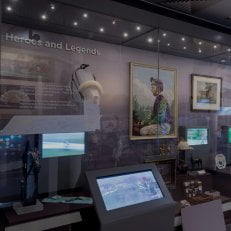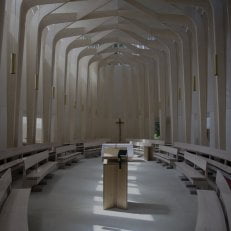Our History
- Looking to the Future
- Contact us if you would like a copy of our new booklet, Craigmyle: The First 60 Years
1959
The John F Rich Company (originally named after the first chairman) was founded by two friends who had met at Oxford University in the 1940s, Donald Shaw and Michael Hooker.
Donald Shaw, 3rd Baron Craigmyle (1923-2004) was a wealthy Roman Catholic convert and exceptional philanthropist who allied his own immense personal generosity towards good causes to the desire to encourage good fundraising practice in others. Michael Hooker (1923-2004) was an educationalist who by virtue of a stint working in New Zealand for the American fundraising group the Wells Organisation returned to Britain in the late 1950s to find himself virtually the only professionally trained British fundraiser in the country.
An office was set up at 11 Old Burlington Street, London, with Michael Hooker installed as the first managing director.
![]()
The company’s earliest focus was on education and schools, with initial clients including Bradfield College, Charterhouse School, The King’s School Ely, Nottingham High School, St John’s College Durham, Tonbridge School and Wycombe Abbey.
1960
Two more experienced fundraisers were recruited including the future managing director Jimmy Bell, while a programme of skills training and expertise sharing for staff was instituted which remains a cornerstone of company culture to this day.
1963
The company was renamed Hooker Craigmyle and Co Ltd.
![]()
A period of massive expansion and investment in higher education followed the publication of the Robbins Report. Craigmyle’s involvement began with a £1 million foundation campaign for the University of Essex in 1963 (which raised £1.34 million). Craigmyle then embarked on a succession of foundation campaigns for other new universities including Lancaster and Stirling.
1964
First publication of Craigmyle’s seminal The Craigmyle Guide to Charitable Giving and Taxation which remained in print and updated annually for nearly half a century. For many years this was used by Inland Revenue as their principle reference book on charitable fundraising.
1966
A Scottish company was established based in Edinburgh. Meanwhile, the company’s head office moved to The Grove in Harpenden around this time.
![]()
Salisbury Cathedral became our first cathedral client.
1972
The company became Craigmyle and Co Ltd, as it remains to this day, following a major restructure involving the departure of Michael Hooker at a time when the company was employing 57 resident campaign directors. Jimmy Bell became the new managing director.
![]()
The first of 30 campaigns was run for Macmillan Cancer Relief during a period of major expansion in the hospice movement in the UK. Another important new client in this era was Nuffield Hospitals for whom 23 appeals were run up to the early 1990s.
1975
![]()
The ending of the direct grant scheme for grammar schools led to increased demand to fundraise for bursaries and improved facilities as many schools opted to go independent. This trend was exemplified in the first of 19 appeals for the Girls Public Day Schools Trust.
1977
![]()
Craigmyle was invited to play a leading role in the appeal to commemorate Her Majesty The Queen’s Silver Jubilee in 1977. The Jubilee Appeal successfully raised £8.5 million in support of youth projects.
1979
![]()
![]()
![]()
The advent of a new Conservative government heralded an era in which major cuts in public expenditure led to increased demand for Craigmyle’s services from universities, hospitals and other bodies hitherto dependent on grants from central and local government.
![]()
Craigmyle was retained for the first time by the young charity The Woodland Trust for specialised consultancy services, establishing a relationship which extended for more than 20 years through a period when the Trust grew to become one of the largest membership charities in the UK.
1981
The company faced another major restructure with the resignation of Jimmy Bell, who was followed as managing director by Frank Berry and then Philip Watts. By the mid-1980s the Scottish company had been closed and the main house Head Office of The Grove in Harpenden had been sold, although the company retained offices in the Stables at The Grove until 2015.
1982
Craigmyle was retained by Ampleforth Abbey to support a capital campaign which raised nearly £4 million, a new record at the time for a school client.
1983
![]()
A very successful appeal was launched on behalf of the Radiotherapy Department of Mount Vernon Hospital to raise £1.25 million for a whole-body scanner. The campaign was notable for pioneering new approaches to community fundraising including the use of direct mail, which would increasingly come to the fore in the 1980s and 90s. Indeed, the campaign was so successful in raising over £2.3 million that a second scanner was bought.
Craigmyle was a founder member of the new Institute of Charity Fundraising Managers, which became The Institute of Fundraising in 2002.
1984
![]()
Craigmyle supported the campaign to restore the south transept of York Minister following a devastating fire that made headlines around the World. The campaign which raised £1.5 million was the third to be completed at York Minster with Craigmyle involvement.
1988
Godfrey Jackson was appointed managing director and during the early 1990s sat on a working party set up to advise the Government on charitable fundraising.
1989
![]()
Craigmyle’s Geoff Howard began working on a campaign for Kingston Theatre Trust which led to the opening of the Rose Theatre in 2006.
1990
Gift Aid was first introduced making it far easier for donors to make one-off gifts in a tax efficient way. The rules were further liberalised in 2000 at which time Craigmyle successfully lobbied the Treasury to clarify that traditional Deed of Covenant giving had not been abolished, as was being widely reported at the time.
![]()
The 1990s witnessed a growing trend for large charities and universities to recruit and set up their own fundraising departments, and by the 2000s a similar trend was prevalent in Craigmyle’s core schools market. These developments reduced traditional clients’ dependence on professional fundraising consultancies such as Craigmyle to run their fundraising campaigns and led to a reduction in the size of the Craigmyle business as well as the evolution of the business towards the provision of different types of service and a focus on developing a presence in new markets.
1990
Craigmyle was a founder member of the Association of Fundraising Consultants with Godfrey Jackson as its first Chair.
1994
![]()
The National Lottery Fund was established changing the landscape for heritage fundraising in the UK. Craigmyle has supported numerous National Lottery funded projects over the years with early successes delivered with St Anne’s Hospice in Gwent, Sports England, and Bournemouth School.
1997
![]()
![]()
Craigmyle was engaged to devise and help implement a major bursaries campaign at Manchester Grammar School to offset the withdrawal of the Government Funded Assisted Places Scheme (worth £850,000 a year to MGS). The campaign raised £10 million, a new record for a school sector client. In the same year a new contract was signed with Southwark Cathedral for a campaign that went on to raise nearly £9 million.
1998
Gill Moody joined Craigmyle and along with long-serving director Geoff Howard she was one of the first wave of consultants to be appointed from a non-military background and with extensive fundraising experience prior to joining the company. Craigmyle’s female consultants now outnumber male consultants by a ratio of two to one in the company’s 60th year.
2000
Mark Jefferies became joint and subsequently sole managing director, having first joined the company as a new recruit in 1981.
2005
![]()
Craigmyle supported a major capital campaign on behalf of St Paul’s School for Boys which raised £32 million, the largest campaign sum ever raised in the company’s history.
![]()
This year also saw the start of an 11 year relationship with The Home of Horseracing Trust, Newmarket, during which £15 million was raised towards the opening of The National Heritage Centre for Horseracing and Sporting Art at the Palace House site in Newmarket.
2006
The first of several campaigns was run with current client Elizabeth College, in Guernsey, raising £1.5 million against a target of £850,000. This was followed by the inauguration of a legacy society, The Dead Donkey Club, which has so far raised a further £1.2 million for the College.
2012
A major restructuring of the company was carried through in the face of a changed fundraising landscape in which clients increasingly have in-house fundraising capability and require smaller and more specialist services from fundraising consultants. Craigmyle now comprises a small team of highly experienced self-employed consultants who work under licence from the Company in accordance with its Code of Practice and fundraising philosophy.
2015
![]()
Craigmyle consultants began working on a major heritage conservation and interpretation project at the Grade I listed Parish Church of St Alfege, Greenwich, leading to a successful £1.7 million bid to the Heritage Lottery Fund and the delivery of £440,000 match funding for the project.
2016
![]()
Bernie Morgan joined Craigmyle as a licensed consultant bringing new skills to the company as an expert in social investment and social enterprise, continuing the tradition of Craigmyle evolving its offering to meet new client needs and circumstances.
2018
![]()
Craigmyle was engaged to provide expert advice to the National Churches Trust on developing the Trust’s grant giving support for churches.
2019 Celebrating 60 years of fundraising
Craigmyle celebrated six decades of working with and supporting clients – between 1959 and 2019 we helped nearly 2000 charities raise over £1 billion at modern day value for capital and revenue projects.
2021
Sian Newton, Director since 2019, was joined by Christine Buccella and Gijs Elsen, marking a new era for the Craigmyle Board.
2021
![]()
Craigmyle consultants helped Pembrokeshire County Council to secure £17.7m for a heritage-led town centre regeneration of Haverfordwest in the inaugural round of the UK Levelling Up Fund.
2022
Sian Newton, Director since 2019, was joined by Christine Buccella and Gijs Elsen, marking a new era for the Craigmyle Board.
Looking to the Future
Although Craigmyle has seen many changes through its long history it remains today the longest-established and one of the most respected fundraising consultancy companies in the UK.
Currently we have ten consultants licensed by Craigmyle who work all over the country with focus a on schools and education, arts and heritage, churches, cathedrals and religious organisations, and social and community action.
Key:
 Health
Health Education
Education Ecclesiastical
Ecclesiastical Arts
Arts Heritage
Heritage Social Enterprise
Social Enterprise Community Welfare
Community Welfare







